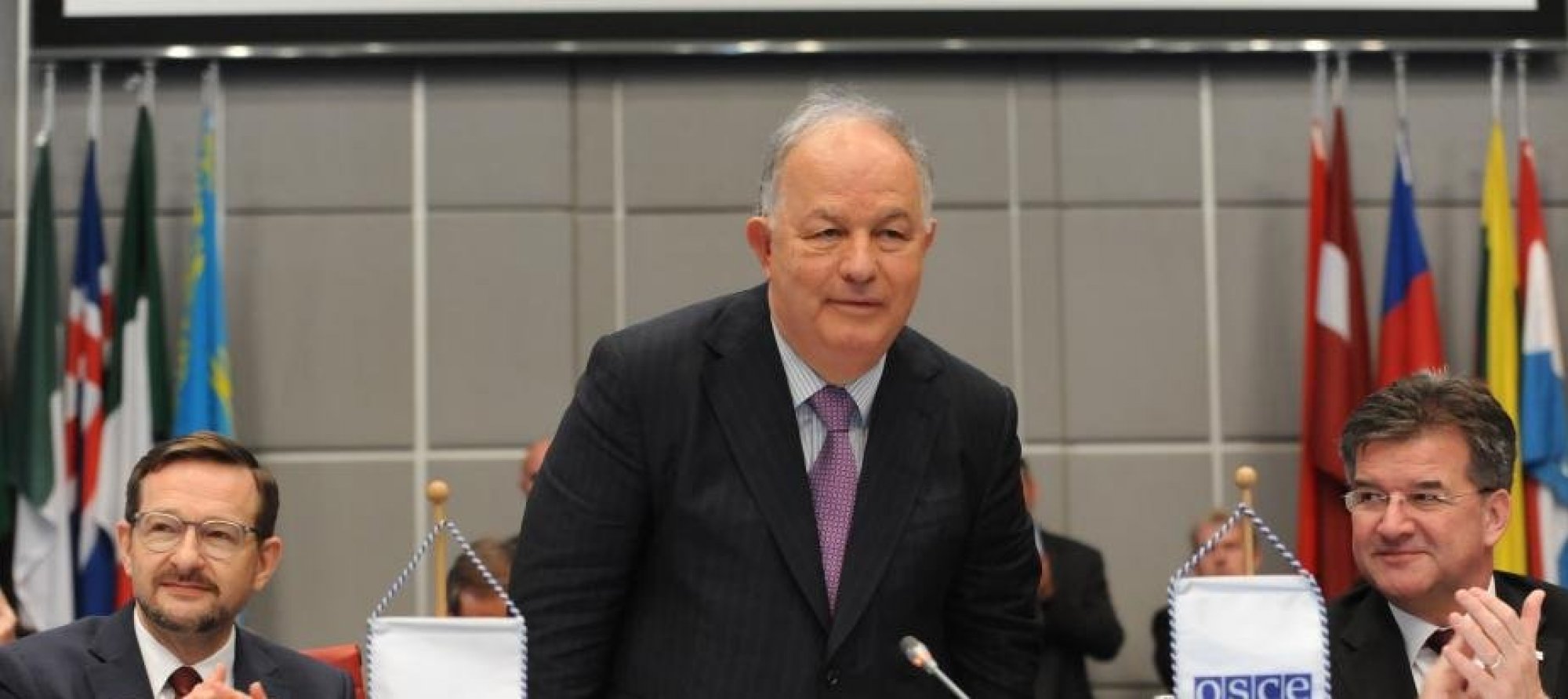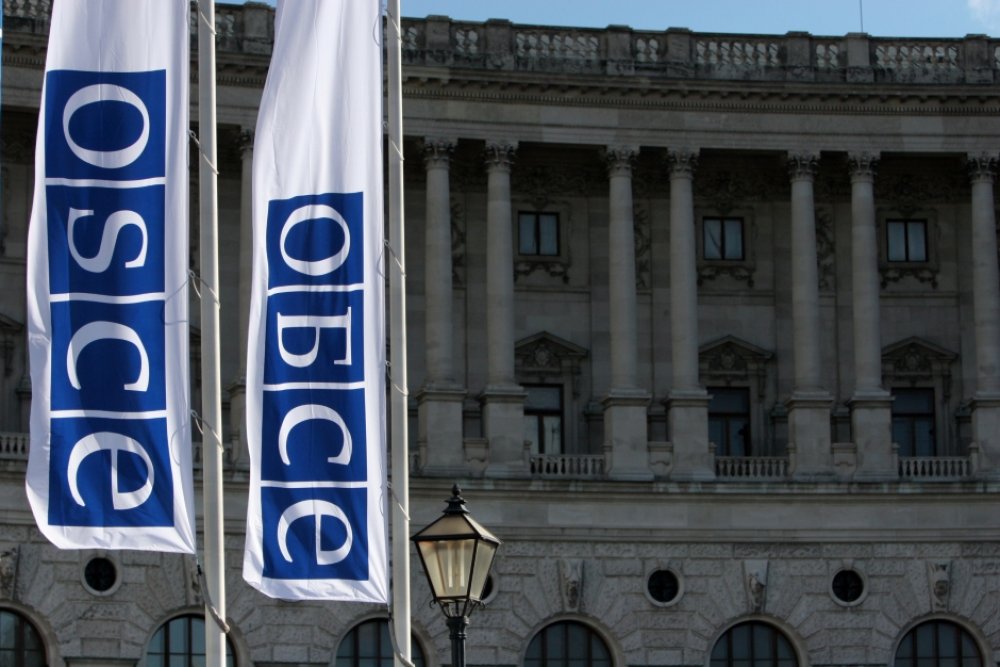OSCE/Micky Kroell

“We helped to contain the expansion of the armed conflict”
In an emotional ceremony, the OSCE bid farewell to the Chief Monitor of the OSCE Special Monitoring Mission to Ukraine, Ambassador Ertuğrul Apakan in Vienna on 30 May. Slovak Foreign Minister and OSCE Chairperson-in-Office Miroslav Lajcak said that five years ago, Ambassador Apakan “took on the challenge of a lifetime without knowing exactly what it would entail”. He praised Apakan’s achievements, saying that he steered the OSCE “through uncharted waters”. He then presented Ambassador Apakan with the golden medal of the Slovak Minister for Foreign and European Affairs, the highest recognition of the Slovak Foreign Service. OSCE Secretary General Thomas Greminger found equal praise for Apakan, noting his “exceptional diplomatic skills and perseverance” and then presented Ambassador Apakan with the OSCE Medal.
In this exclusive interview, Ambassador Apakan speaks about his biggest challenges, most difficult moments, and achievements of the past five years.
You took over the job as Chief Monitor of the OSCE Special Monitor Mission (SMM) to Ukraine in April 2014, just when tensions were rising in eastern Ukraine. What was it like at the time when you arrived on the ground and how was the atmosphere? How did you feel about taking on this very challenging job?
When I took up the job, I first and foremost tried to understand the mandate of our mission, including its content and objectives. It is an innovative and the same time very broad document. Whenever a question came to my mind, I looked at the mandate for the answer. Our main job has been from the beginning to implement that mandate, on the basis of impartiality and objectivity, and later on, also to facilitate the implementation of the Minsk Agreements.
To be more precise, at the beginning, our job was to work for the stability and normalization of Ukraine. But following the events of April and May 2014, things changed and the situation became more militarized and actually turned into an armed conflict in Donbass. As of this moment onwards, our additional task was to monitor the ceasefire line, which is disputed and about 487 km long.
In all of this, our guiding principle has always been our mandate and the territorial integrity and political unity of Ukraine.
What would you describe as the most challenging moment of the past five years in the job?
For me the abduction of eight of our people in May 2014 was really bad, and I will never forget it. Our people were kept abducted for one month.
The tragic loss of our friend Joseph Stone, a member of our patrol, whose vehicle hit a landmine in April 2017, was another trauma.
And when Malaysian Airways MH17 crashed in July 2014 over eastern Ukraine, our monitors were actually on the site collecting the remnants of those who died in the crash. This was also a real shock. We navigated through these unfortunate events, but at the same time, we developed a certain maturity. We developed not only operational skills but also learned how to reach out to the civilians and never left Luhansk and Donetsk cities, even under heavy shelling.
What do you think are the main contributions of the OSCE SMM?
Our team is on the move on a daily basis. Our patrols are going through the contact line and into remote parts of the country. Being present on the ground gives us the tools to observe the situation carefully, we can also contribute to the containment of the conflict, we can issue early warnings, and we can reach out to the people on the ground. On this last point, we also closely work with other international organizations, for example with the International Committee of the Red Cross and the United Nations.
We have achieved several recommitments to the ceasefire, particularly for holiday periods such as Christmas and Easter, as well as for the harvest season and for the start of the school year.
In 2018, we also achieved nearly 1200 local ceasefires, which enabled us to facilitate the repair of critical civilian infrastructure, such as electricity, gas, and water systems. All in all, 80 big installations have been repaired in this way. All this is contributing to the normalization of the situation on the ground.
We are also observing entry-exit checkpoints on a daily basis. A very large number of people is on the move. On a monthly basis, nearly 1 million people are moving across the contact line in both directions. This shows that people really want peace and normalization. They want to collect their pensions, visit their families and friends.
How concretely did you try to improve the lives of people on the ground?
I think with our presence, we actually contained the expansion of the armed conflict. Furthermore, we helped to provide humanitarian remedies to the civilian population, in close cooperation with the International Committee of the Red Cross and also with UNHCR.
We were in Minsk, in the Trilateral Contact Group, contributing to the process and at the same time we were taking local and regional arrangements and steps such as humanitarian demining to ensure progress on the ground. Our presence is providing some assurance to the civilian population.
I would also like to take a brief look at the higher level of negotiations in Minsk. How do you think that the military logic of negotiations can ever be broken?
I think that the discussions are not easy but we keep people around the table and we keep the channels of communication open. By being on the ground in Ukraine and at the negotiating table at the same time, we are contributing to the management and resolution of the conflict.
Finally, what would be your advice to your successor and where are you going next?
This job requires patience, persistence and continuation. I know Ambassador Yaşar Halit Çevik well and consider him a friend and an experienced diplomat, and of course I wish him all the best of success.
And when it comes to my future plans, I will maybe start thinking about them tomorrow. I still feel like I am on duty.



Comments
* Your email address will not be published